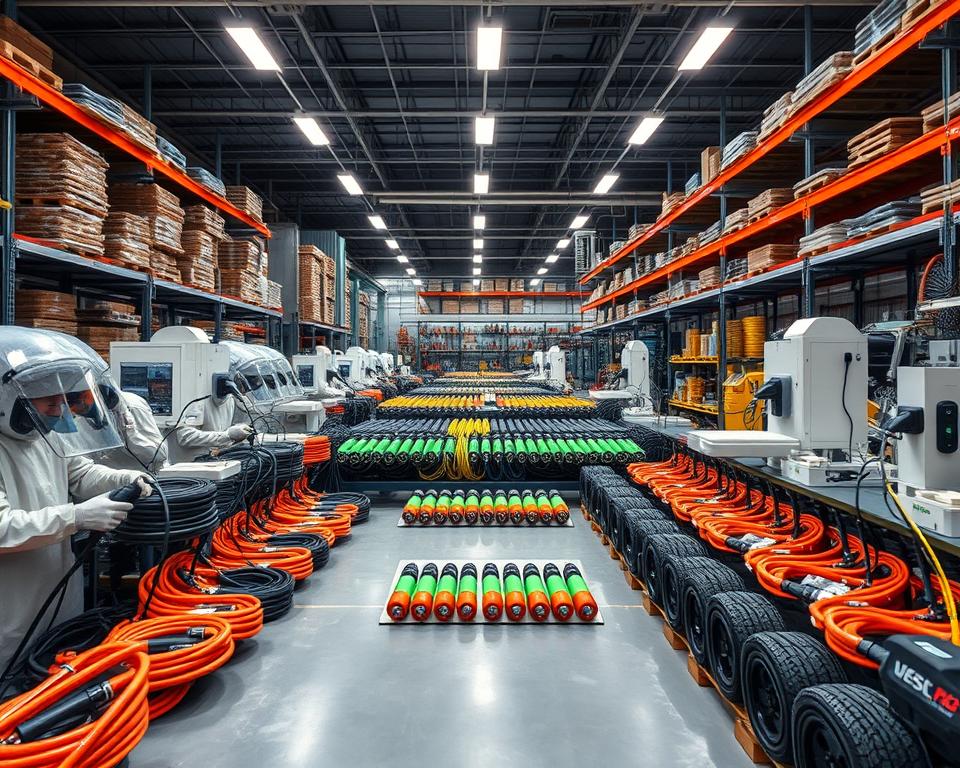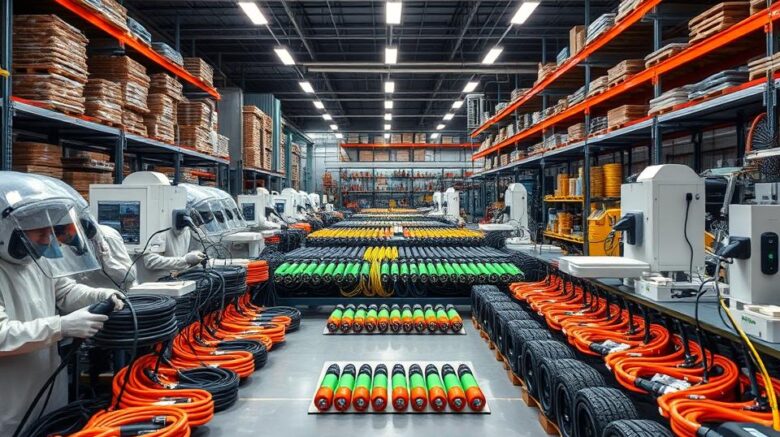Leading EV Charging Cable Manufacturers for Your Electric Vehicle
EV adoption is booming, with the demand for trustworthy and fast charging solutions increasing sharply. Currently, top brands have been at the vanguard of this change, providing top-tier charging infrastructure. Southwire, for instance, has been a significant player since 2014, garnering 1000+ five-star reviews and a 75-year legacy in electrical construction.
The upswing in electric vehicle adoption drives demand for durable, fast, and secure EV Charger Manufacturers. Top manufacturers are pioneering to address changing requirements, offering solutions that improve the overall charging experience.
Understanding the variations between various charging solutions matters for choosing correctly. Quality charging infrastructure directly impacts vehicle performance and user experience.
Main Points
- Top manufacturers offer high-quality charging cables for improved durability and safety.
- Growing EV adoption fuels demand for fast, reliable infrastructure.
- Industry leaders develop cutting-edge products for EV drivers.
- High-grade cables improve energy transfer and driving range.
- Opting for top-tier cables yields future savings.

Why High-Quality EV Cables Matter
As electric vehicles become increasingly popular, the importance of top-grade EV charging cables cannot be overstated. The performance, safety, and reliability of electric vehicle charging systems depend heavily on the quality of the charging cables used.
How EV Charging Tech Has Advanced
Electric vehicle charging technology has undergone significant advancements in recent years, with a priority on faster charging speeds and improved safety features. Today’s EV charging cables are built for these requirements, featuring superior materials and construction techniques to minimize power loss and maximize charging efficiency.
The Case for Premium Charging Infrastructure
High-grade cables ensure reliable, safe charging. Durable features, such as weather resistance and temperature tolerance, ensure reliable operation across various environments. Moreover, regulatory compliance and following protocols are essential in guaranteeing safe operation.
| Key Features | Benefits |
|---|---|
| Superior materials and construction | Reduced energy waste |
| Enhanced durability features | All-weather reliability |
| Standards adherence | Certified safety |
| Serviceability | Long-term value proposition, reduced waste |
Products from Aichie Tech Electronics pass The Cable Lab’s stringent tests. Choosing maintainable Portable EV Charger, owners save money long-term through repairs, lowering environmental impact.
Premier Chinese EV Cable Suppliers
China is home to a growing number of EV charging cable manufacturers. They play a key role in global EV infrastructure, providing high-quality automotive cables designed for different applications.
Wottz: Industry Leaders Since 2014
Wottz has been a leading cable manufacturer since 2014. They offer a range of cables that cover Mode 1–4 charging standards, including Mode 1, 2, 3, and fast-charging Mode 4 DC Charging.
Aichie Tech Electronics’ 75-Year Legacy
Aichie Tech Electronics’ seven-decade legacy informs its premium cable designs. Their products are built for residential and commercial applications.
Other Notable Manufacturers in the Market
Specialists in Type 1/Type 2 connectors and environmental-resistant cables are emerging players. These include Type 1 & 2 connector experts, as well as companies developing cables with enhanced flexibility and resistance to environmental factors.
Understanding Different Types of EV Charging Cables
As electric vehicles become increasingly popular, understanding the various types of EV Charging Cables is crucial for optimal charging experiences. Different cables suit different charging needs. The diversity in EV charging infrastructure necessitates a closer look at the cable options.
Comparing SAE J1772 and Mennekes Cables
Type1 and Type2 charging cables are two common standards used for EV charging. Type 1, also known as SAE J1772, is predominantly used in North America, while Type 2, or Mennekes, is the standard in Europe. The choice between these cables depends on the vehicle’s connector type and the charging station’s compatibility. Type 2 cables often handle greater power, making them ideal for speed.
Level 2 & Fast DC Cables
Level2 charging cables offer faster charging than Level1, using 240V AC power to deliver up to 19.2 kW of power. DC Fast Charging cables, on the other hand, enable quick top-ups by on-site AC→DC conversion, allowing for much faster charging times. These cables are key for highway charging, letting EVs charge in minutes.
Granny Chargers vs Tethered Units
Granny chargers plug into home outlets for emergency use. Tethered cables are attached permanently, providing a convenient but less flexible charging solution. The choice depends on the owner’s charging needs and preferences.
Cable length, power rating, and connector type matter most. For instance, portable charging cables range from simple L1 cords to full L2 kits. Vehicle-to-load (V2L) cables represent an emerging category, enabling EVs to power external devices.
- Portable charging cables offer flexibility, with options ranging from basic to more robust Level2 solutions.
- Tethered cables are permanently attached to charging stations, limiting flexibility but eliminating the need for personal cables.
- Cable length is a critical consideration, with options ranging from 5-meter standard cables to 50-meter extended cables.
Essential EV Cable Characteristics
Premium cables stand out for durability, safety, and performance. These features are vital to safe, efficient charging.
Robustness and Weatherproofing
Cables must withstand rain, sun, and cold. Manufacturers like Wottz and Southwire use RoHS-compliant recyclable compounds, ensuring they perform in harsh climates. Their repairable builds support longevity and eco-reuse.
User-Friendly Design
Flexibility and ease of use are also critical factors. High-quality EV charging cables are designed to be flexible, making them easier to handle and maneuver. This flexibility is combined with rugged construction for lasting performance.
Certified Safety and Standards
Safety certifications and compliance with international standards are non-negotiable for reputable EV charging cable manufacturers. They ensure their products meet or exceed standards such as IEC62196 for connectors and UL2594 in North America. Rigorous third-party testing evaluates electrical safety, mechanical durability, and environmental resistance.
| Certification | Description | Region |
|---|---|---|
| IEC62196 | Connector safety standards | International |
| UL2594 | Standard for electric vehicle supply equipment | North America |
| ROHS | Restriction of hazardous substances | International |
By focusing on these key features, manufacturers can provide EV charging cables that not only meet the highest quality and safety standards but also enhance the overall user experience.
Next-Gen Charging Cable Tech
New cable tech is transforming EV charging, with a focus on speed, reliable data transfer, and eco-friendly materials.
Liquid Cooling for Rapid EV Charging
Cooling fluids enable higher charge rates, enabling electric vehicles to charge at significantly higher speeds without overheating.
Advanced Connector Tech
Hyperboloid contact points improve electrical connection, ensuring reliable and efficient data transfer during the charging process.
Eco-Friendly Cable Compounds
Companies focus on green materials, using recyclable materials and eco-friendly compounds that reduce environmental impact. For instance, companies like Aichie Tech Electronics and Wottz are adopting serviceable design philosophies and RoHS compliance to minimize waste and promote recycling.
The industry’s shift towards sustainability includes the use of TPU jackets, avoidance of hazardous substances, and the development of take-back programs for end-of-life disassembly and material recovery.
Choosing the Perfect EV Cable
Selecting the proper cable ensures optimal performance. To make an informed decision, consider several key factors.
Connector Compatibility
Verify your car’s inlet and cable plug match. Your vehicle’s onboard charger capacity sets the upper limit for AC power.
Picking the Right Cable Length
Select a cord length based on parking and outlet location. A longer cable adds reach at the cost of extra weight.
Matching Power and Speed
Ensure cable amperage aligns with charger and car. Standard Level 2 home charging operates at 7.2 kW, but some vehicles support up to 19.2 kW with appropriate electrical service.
By considering these factors, you can select an EV charging cable that meets your needs and enhances your overall charging experience.
Conclusion: Investing in Quality EV Charging Infrastructure
As the electric vehicle market continues to expand, the importance of quality charging infrastructure cannot be overstated. Choosing cables from Wottz or Aichie Tech Electronics provides long-term value and reliability. Their serviceable designs enable repairs over replacements to cut waste. This approach supports eco-friendly EV use.
Selecting top-grade infrastructure prepares you for next-gen charging.
